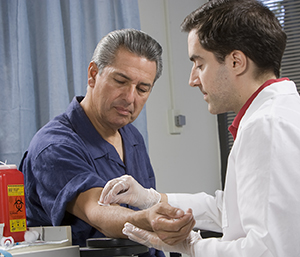A
B
C
D
E
F
G
H
I
J
K
L
M
N
O
P
Q
R
S
T
U
V
W
X
Y
Z
Click a letter to see a list of conditions beginning with that letter.
Click 'Topic Index' to return to the index for the current topic.
Click 'Library Index' to return to the listing of all topics.
How Hepatitis C is Diagnosed
To find out if you are infected with the hepatitis C virus, your healthcare provider will ask questions about your health. They may also try to figure out how long you have been infected with hepatitis C. This may involve questions that seem personal. It’s important to answer honestly. You should also mention any symptoms that concern you. To test for hepatitis C, a sample of your blood is taken. The blood is sent to a lab. It may take several days to get your test results. You may have a physical exam and other tests help check for liver damage.

Get tested
Experts advise that all adults ages 18 and older be checked (screened) at least once for hepatitis C. This is done by a simple blood test to show if you have or ever had hepatitis C. Blood tests look for substances in your blood that are linked to hepatitis C. These tests include:
-
Anti-HCV antibody. The body tries to fight hepatitis C by making an antibody against HCV. This protein can be tested in the blood. If found, it means you have been infected at some point by hepatitis C. It does not mean that you are currently infected with hepatitis C. You may have cleared the virus. You need a follow-up test to confirm if you still have the infection or have cleared it. The follow-up test is called HCV RNA.
-
ALT. This is a liver enzyme. Blood may have more ALT if the liver has been damaged. Many conditions can increase ALT. It is not specific to hepatitis C. If someone has an elevated ALT on liver tests, then hepatitis C should be ruled out with the Anti-HCV antibody.
-
Genotype. There are six hepatitis C genotypes. A blood test can show which genotype you have. This will affect the type of treatment.
-
HCV RNA. This is called a confirmatory test because it confirms whether or not there is hepatitis C virus circulating in your body. It is a test looking for the virus's genetic material in your blood.
The tests listed above are just some that you may have. It's likely that your healthcare provider will also order more blood tests.
Looking for liver damage
During an exam, your healthcare provider may feel your abdomen. This is to see if your liver is swollen or painful. Tests may also be done to check your liver for damage. These tests include:
-
CT scan. This is a series of X-rays that show a detailed picture of the liver by making cross-sectional images.
-
Fibrosis panel. This blood test can help show how bad the liver disease is.
-
Liver biopsy. A needle is used to take a small sample of tissue from the liver. The sample is then viewed under a microscope to look for inflammation and the amount of scar tissue.
-
MRI scan. This is a scan where strong magnetic fields and radio waves make images of the liver and blood vessels.
-
Ultrasound. This test uses painless sound waves to create a picture of the liver. It can roughly stage your liver disease. Your spleen size and portal vein size may be measured with each exam. A newer type of ultrasound called elastography gives more accurate information about your liver disease.
Checking for other infections
Hepatitis C infection can be more dangerous if you also have certain other viruses. Your healthcare provider may test you for HIV and other types of hepatitis, such as types A and B. If you have not had hepatitis A or B, you may be given vaccines to protect you from getting them in the future.
Online Medical Reviewer:
Chris Southard RN
Online Medical Reviewer:
Rita Sather RN
Online Medical Reviewer:
Sabrina Felson MD
Date Last Reviewed:
9/1/2024
© 2000-2024 The StayWell Company, LLC. All rights reserved. This information is not intended as a substitute for professional medical care. Always follow your healthcare professional's instructions.